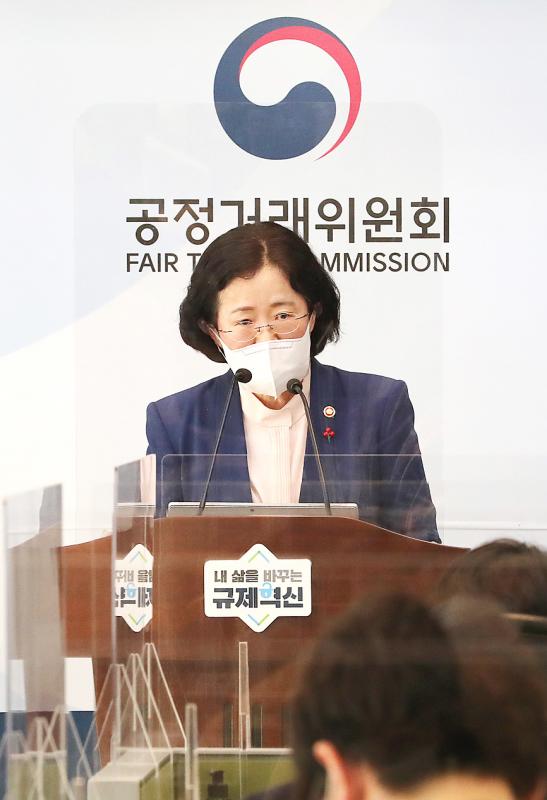South Korea’s antitrust watchdog yesterday ordered Delivery Hero SE to sell its local unit before proceeding with its planned acquisition of the country’s largest food delivery platform.
The Korea Fair Trade Commission approved Delivery Hero’s takeover of Woowa Brothers Corp under the condition that it divests Delivery Hero Korea, which operates the nation’s second-largest food delivery app under the Yogiyo brand, the regulator said in a statement.
The decision is in line with an initial report made by a review team at the commission last month.

Photo: EPA-EFE
The commission held its final hearing last week to make yesterday’s order.
The merger of Yogiyo and Woowa’s “Baedal Minjok” brand, which together control a combined market share of 99.2 percent, could lead to higher fees for restaurants and also hurt customers, the commission said.
It could also prevent other competitors from entering the market because of its strong market power and information assets, it said.
The decision came after some South Korean lawmakers expressed concerns over the takeover as the COVID-19 pandemic put pressure on small restaurants and mom-and-pop stores.
Delivery Hero announced plans to take majority control of the Korean food-delivery app in December last year at a US$4 billion valuation, expanding the German company’s presence in the fast-growing Asian market.
The investment would also help Woowa go up against Softbank Group Corp-funded competitor Coupang, which has been investing aggressively in food delivery.

MULTIFACETED: A task force has analyzed possible scenarios and created responses to assist domestic industries in dealing with US tariffs, the economics minister said The Executive Yuan is tomorrow to announce countermeasures to US President Donald Trump’s planned reciprocal tariffs, although the details of the plan would not be made public until Monday next week, Minister of Economic Affairs J.W. Kuo (郭智輝) said yesterday. The Cabinet established an economic and trade task force in November last year to deal with US trade and tariff related issues, Kuo told reporters outside the legislature in Taipei. The task force has been analyzing and evaluating all kinds of scenarios to identify suitable responses and determine how best to assist domestic industries in managing the effects of Trump’s tariffs, he

TIGHT-LIPPED: UMC said it had no merger plans at the moment, after Nikkei Asia reported that the firm and GlobalFoundries were considering restarting merger talks United Microelectronics Corp (UMC, 聯電), the world’s No. 4 contract chipmaker, yesterday launched a new US$5 billion 12-inch chip factory in Singapore as part of its latest effort to diversify its manufacturing footprint amid growing geopolitical risks. The new factory, adjacent to UMC’s existing Singapore fab in the Pasir Res Wafer Fab Park, is scheduled to enter volume production next year, utilizing mature 22-nanometer and 28-nanometer process technologies, UMC said in a statement. The company plans to invest US$5 billion during the first phase of the new fab, which would have an installed capacity of 30,000 12-inch wafers per month, it said. The

Taiwan’s official purchasing managers’ index (PMI) last month rose 0.2 percentage points to 54.2, in a second consecutive month of expansion, thanks to front-loading demand intended to avoid potential US tariff hikes, the Chung-Hua Institution for Economic Research (CIER, 中華經濟研究院) said yesterday. While short-term demand appeared robust, uncertainties rose due to US President Donald Trump’s unpredictable trade policy, CIER president Lien Hsien-ming (連賢明) told a news conference in Taipei. Taiwan’s economy this year would be characterized by high-level fluctuations and the volatility would be wilder than most expect, Lien said Demand for electronics, particularly semiconductors, continues to benefit from US technology giants’ effort

‘SWASTICAR’: Tesla CEO Elon Musk’s close association with Donald Trump has prompted opponents to brand him a ‘Nazi’ and resulted in a dramatic drop in sales Demonstrators descended on Tesla Inc dealerships across the US, and in Europe and Canada on Saturday to protest company chief Elon Musk, who has amassed extraordinary power as a top adviser to US President Donald Trump. Waving signs with messages such as “Musk is stealing our money” and “Reclaim our country,” the protests largely took place peacefully following fiery episodes of vandalism on Tesla vehicles, dealerships and other facilities in recent weeks that US officials have denounced as terrorism. Hundreds rallied on Saturday outside the Tesla dealership in Manhattan. Some blasted Musk, the world’s richest man, while others demanded the shuttering of his